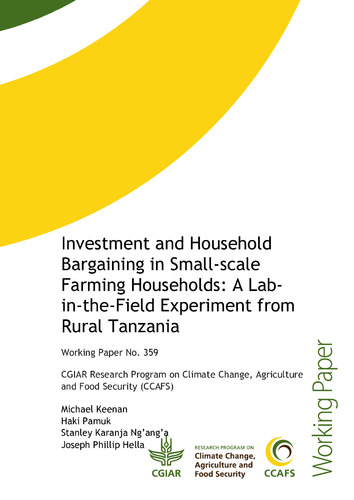Investment and Household Bargaining in Small-scale Farming Households - A Lab-in-the-Field Experiment from Rural Tanzania
Agricultural investments often carry labor costs and market risks, and spouses negotiate and bargain to settle their conflicting preferences for risk and differing views on individual labor costs. Using a lab-in-the-field experiment with a real-effort task, we analyze man, woman, and joint decision-making in those investments. Our experiment randomizes the assignment of the investment decision-maker and laborer performing the real-effort task. This randomization allows us to obtain the effects of gender-related and joint decision-making on the amount of labor-intensive investments, allocation of those investments between risky and not risky alternatives within households, and outcomes of those decisions. Our findings show that men prefer to take production and market risks more often than women, investing higher amounts in risky investments. However, those investments' returns are low, as they cannot complete the task in which they have invested. When couples jointly decide, they choose investment amounts in line with man spouse preferences; however, allocate investments between risky and not risky investments in line with woman preferences. We also find that woman spouses who have participated in a gender-related training program take more risks and the joint investment decisions of the couple are closer to woman investment decisions when compared to other couples. Our results are in line with previous studies on the behavioral aspects of agricultural investments and can guide organizations in improving program design to increase agricultural technology and crop adoption. This paper contributes to the scarce literature on behavioral aspects influencing the gender gap in agricultural production and technology adoption.

